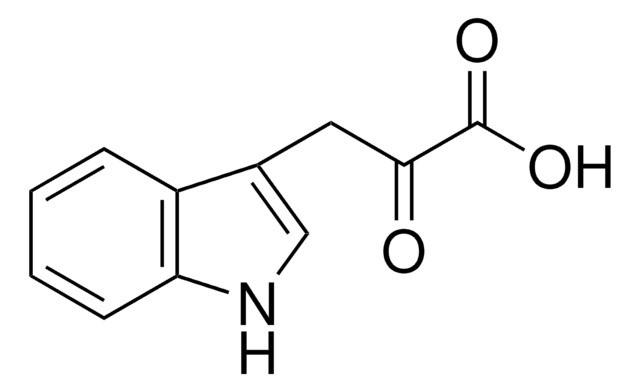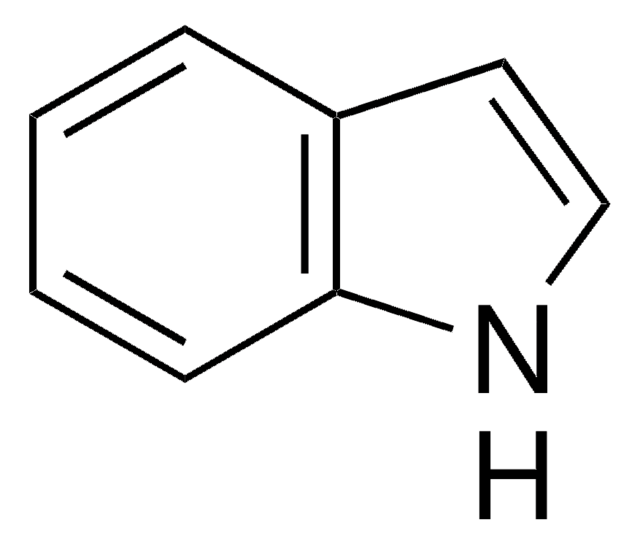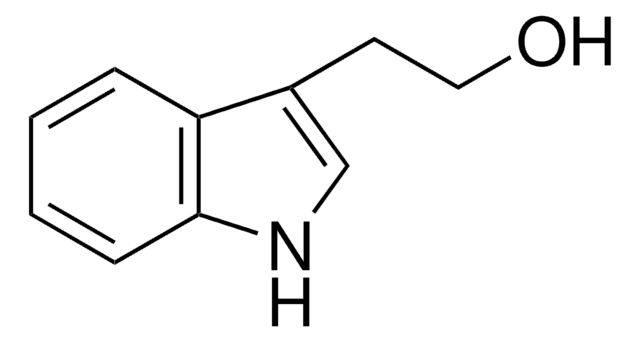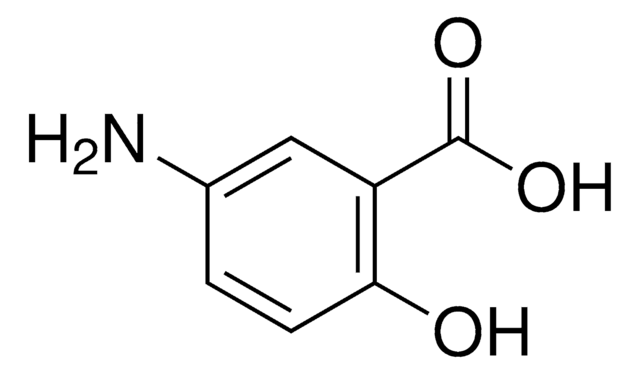57400
Indole-3-propionic acid
≥99.0% (T)
Synonym(s):
3-(3-Indolyl)propanoic acid, 3-(3-Indolyl)propionic acid, IPA, NSC 3252, NSC 47831
About This Item
Recommended Products
Quality Level
assay
≥99.0% (T)
form
solid
ign. residue
≤0.1%
mp
~133 °C
SMILES string
OC(=O)CCc1c[nH]c2ccccc12
InChI
1S/C11H11NO2/c13-11(14)6-5-8-7-12-10-4-2-1-3-9(8)10/h1-4,7,12H,5-6H2,(H,13,14)
Inchi Key
GOLXRNDWAUTYKT-UHFFFAOYSA-N
Looking for similar products? Visit Product Comparison Guide
Application
- Elucidating the Interaction of Indole-3-Propionic Acid and Calf Thymus DNA: Multispectroscopic and Computational Modeling Approaches.: This study investigates the binding interaction between indole-3-propionic acid and calf thymus DNA, employing multispectroscopic techniques and computational modeling. The insights gained could lead to a deeper understanding of the molecular mechanisms underpinning the protective effects of this compound on DNA integrity, critical for developing novel therapeutic strategies in biochemistry (Wei Y et al., 2024).
- The Tryptophan Metabolite Indole-3-Propionic Acid Raises Kynurenic Acid Levels in the Rat Brain In Vivo.: This research demonstrates how indole-3-propionic acid, a metabolite of tryptophan, can increase levels of kynurenic acid in the brain, offering potential benefits in neuroprotective strategies and the study of psychiatric disorders. Such findings highlight significant implications for mental health research and therapeutic applications (Sathyasaikumar KV et al., 2024).
- Serum-Derived Bovine Immunoglobulin Promotes Barrier Integrity and Lowers Inflammation for 24 Human Adults Ex Vivo.: This study explores how indole-3-propionic acid impacts inflammatory responses and gut barrier integrity, providing valuable data for nutritional science and clinical applications aimed at reducing gastrointestinal disorders and enhancing overall gut health (Van den Abbeele P et al., 2024).
- The Effect of Type 2 Resistant Starch and Indole-3-Propionic Acid on Ameliorating High-Fat-Diet-Induced Hepatic Steatosis and Gut Dysbiosis.: This publication discusses the beneficial effects of indole-3-propionic acid in conjunction with type 2 resistant starch on reducing hepatic steatosis and correcting gut dysbiosis caused by high-fat diets, pointing to potential dietary interventions for managing obesity and associated metabolic disorders (Yang M et al., 2024).
- Gut microbiome and cardiometabolic comorbidities in people living with HIV.: This review highlights the role of indole-3-propionic acid in modulating the gut microbiome and its potential effects on cardiometabolic health in HIV-positive individuals. The findings suggest a promising avenue for improving the quality of life and health outcomes in this population through microbiome-based interventions (Trøseid M et al., 2024).
Biochem/physiol Actions
Storage Class
11 - Combustible Solids
wgk_germany
WGK 3
flash_point_f
Not applicable
flash_point_c
Not applicable
ppe
Eyeshields, Gloves, type N95 (US)
Choose from one of the most recent versions:
Already Own This Product?
Find documentation for the products that you have recently purchased in the Document Library.
Customers Also Viewed
Our team of scientists has experience in all areas of research including Life Science, Material Science, Chemical Synthesis, Chromatography, Analytical and many others.
Contact Technical Service










